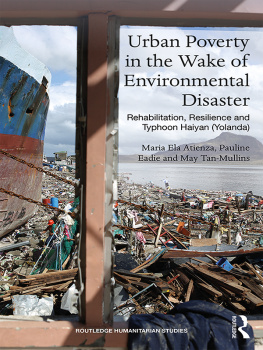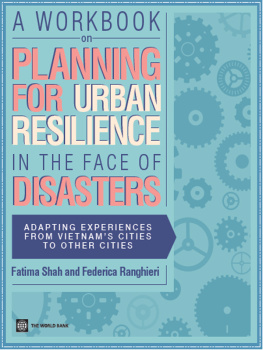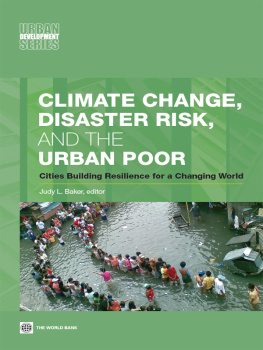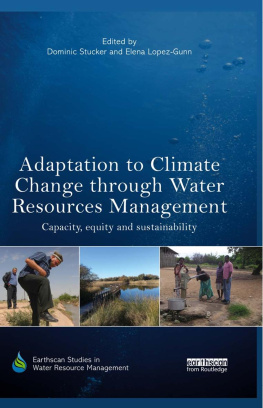This book invites reflection on the politics and possibilities of governance in perilous times. It offers empirically grounded insights about the structural causes of vulnerability and challenges readers to consider innovative solutions to disaster response, rebuilding and rehabilitation.
Nicole Curato, Senior Research Fellow, Centre for Deliberative Democracy and Global Governance, University of Canberra, Australia
With their cutting-edge research on post-disaster relief and recovery, Pauline Eadie and her team deliver valuable lessons-learned from the aftermath of Typhoon Yolanda in the Philippines. If you want to know how post-disaster poverty-relief strategies succeed or fail and why, this is the book!
Deirdre McKay, Keele University, UK and author of Global Filipinos and Archipelago of Care
Finally, a definitive and comprehensive assessment of Typhoon Yolanda has been produced. This book will be useful for everyone who aims to understand what happened, what has been done, and why certain disaster relief and rehabilitation strategies worked while others did not, before, during and after Typhoon Yolanda. This book also offers valuable guidance on how similar work should be undertaken in the future. The book is encompassing in its treatment of post-Yolanda recovery and assessment of the predicaments that arose during post-disaster reconstruction. While it will not provide solace to those who are dismayed at the outcomes, it will at least provide clarity on some of the nagging questions that remain about why rehabilitation efforts stalled after the initial humanitarian and emergency recovery phase ended. The findings and implications presented in this book are representative of the five year time frame since Typhoon Yolanda. However the post-Yolanda rehabilitation effort is an ongoing process and many of the issues raised are yet to be resolved. This will continue to be the case, until durable disaster rehabilitation solutions can be developed and lessons are learned.
Albert Salamanca, Senior Research Fellow, Stockholm Environment Institute
Attuned to the cultural norms of communities and the power struggles behind well-meaning but clumsy bureaucratic procedure, this book exposes both profound and ordinary obstacles to accountable disaster response. This is a must-read for geographers, sociologists, and development scholars and practitioners interested in the politics of aid.
Jonathan Corpus Ong, Associate Professor of Global Digital Media, University of Massachusetts at Amherst, USA
This book is a powerful reminder to practitioners, scholars and students that we must consider the immediate and long-term impacts of disasters on one of the most vulnerable groups in post-disaster recovery: the urban poor. This multi-year study is essential reading for anyone seeking to understand poverty alleviation in post-disaster urban environments.
Yvonne Su, University of Guelph, Canada
Urban Poverty in the Wake of Environmental Disaster
This book investigates the best strategies for poverty alleviation in post-disaster urban environments, and the conditions necessary for the success and scaling-up of these strategies. Using the case study of Typhoon Yolanda (Haiyan) in the Philippines, the strongest typhoon ever to make landfall, the book aims to draw out policy recommendations relevant for other middle- and lower-income countries facing similar urban environmental challenges.
Humans are increasingly living in densely populated and highly vulnerable areas, often coastal. This increased density of human settlements leads to increased material damage and high death tolls, and this vulnerability is often exacerbated by climate change. This book focuses on urban population risk, vulnerability to disasters, resilience to environmental shocks, and adaptation in relation to paths in and out of poverty.
Using both qualitative and quantitative methods, including primary survey data from victims and those charged with overseeing the relief effort in the Philippines, Urban Poverty in the Wake of Environmental Disaster has significant implications for disaster risk reduction as it relates to the urban poor and is highly recommended for scholars and practitioners of development studies, environment studies, and disaster relief and risk reduction.
Maria Ela Atienza, Department of Political Science, University of the Philippines Diliman, the Philippines.
Pauline Eadie, School of Politics and International Relations, University of Nottingham, Nottingham, UK.
May Tan-Mullins, School of International Studies, University of Nottingham, Ningbo, China.
Routledge Humanitarian Studies
Series editors: Alex de Waal, Dorothea Hilhorst, Annette Jansen and Mihir Bhatt
Editorial Board: Dennis Dijkzeul, Wendy Fenton, Kirsten Johnson, Julia Streets, Peter Walker
The Routledge Humanitarian Studies series in collaboration with the International Humanitarian Studies Association (IHSA) takes a comprehensive approach to the growing field of expertise that is humanitarian studies. This field is concerned with humanitarian crises caused by natural disaster, conflict or political instability and deals with the study of how humanitarian crises evolve, how they affect people and their institutions and societies, and the responses they trigger.
We invite book proposals that address, amongst other topics, questions of aid delivery, institutional aspects of service provision, the dynamics of rebel wars, state building after war, the international architecture of peacekeeping, the ways in which ordinary people continue to make a living throughout crises, and the effect of crises on gender relations.
This interdisciplinary series draws on and is relevant to a range of disciplines, including development studies, international relations, international law, anthropology, peace and conflict studies, public health and migration studies.
Disaster Management in Australia
Government Coordination in a Time of Crisis
George Carayannopoulos
Production of Disaster and Recovery in Post-Earthquake Haiti
Disaster Industrial Complex
Juliana Svistova and Loretta Pyles
International Humanitarian NGOs and State Relations
Principles, Politics, and Identity
Andrew J. Cunningham
Crisis Management Beyond the Humanitarian-Development Nexus
Edited by Atsushi Hanatani, Oscar A. Gmez and Chigumi Kawaguchi
Urban Poverty in the Wake of Environmental Disaster
Rehabilitation, Resilience and Typhoon Haiyan (Yolanda)
Maria Ela Atienza, Pauline Eadie and May Tan-Mullins
First published 2019
by Routledge
2 Park Square, Milton Park, Abingdon, Oxon OX14 4RN
and by Routledge
52 Vanderbilt Avenue, New York, NY 10017
Routledge is an imprint of the Taylor & Francis Group, an informa business
2019 Maria Ela Atienza, Pauline Eadie and May Tan-Mullins
The right of Maria Ela Atienza, Pauline Eadie and May Tan-Mullins to be identified as authors of this work has been asserted by them in accordance with sections 77 and 78 of the Copyright, Designs and Patents Act 1988.
All rights reserved. No part of this book may be reprinted or reproduced or utilised in any form or by any electronic, mechanical, or other means, now known or hereafter invented, including photocopying and recording, or in any information storage or retrieval system, without permission in writing from the publishers.






